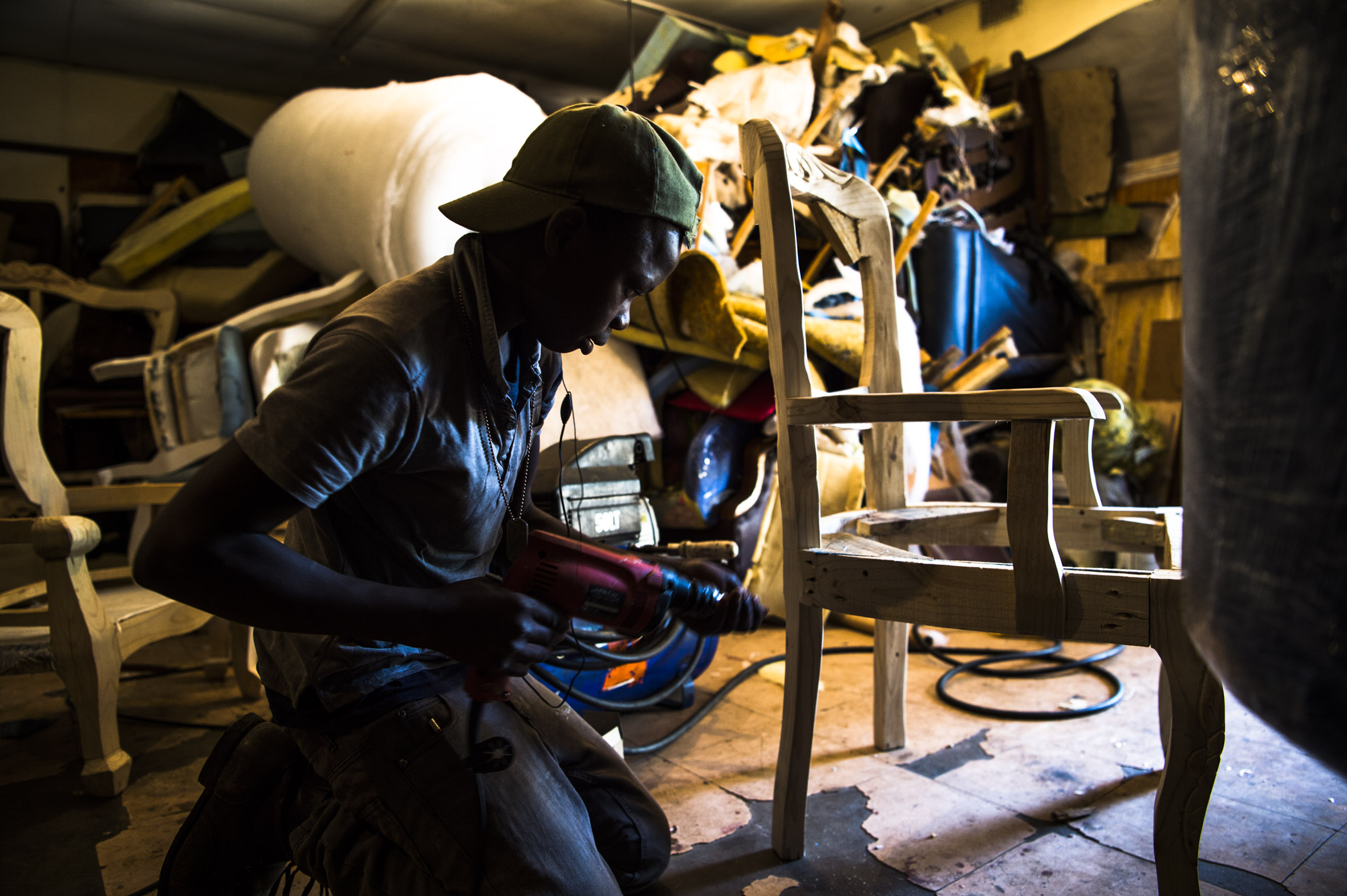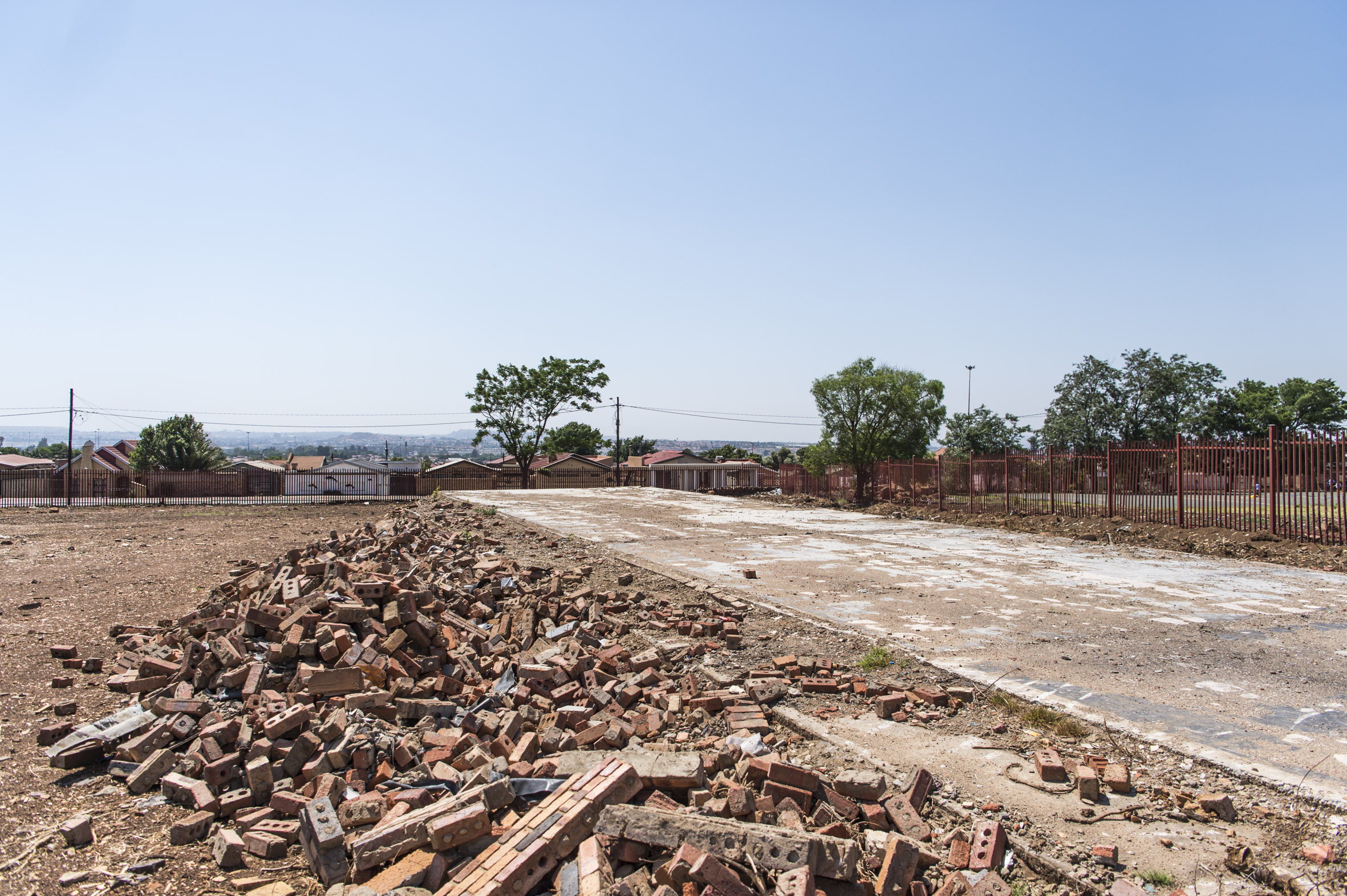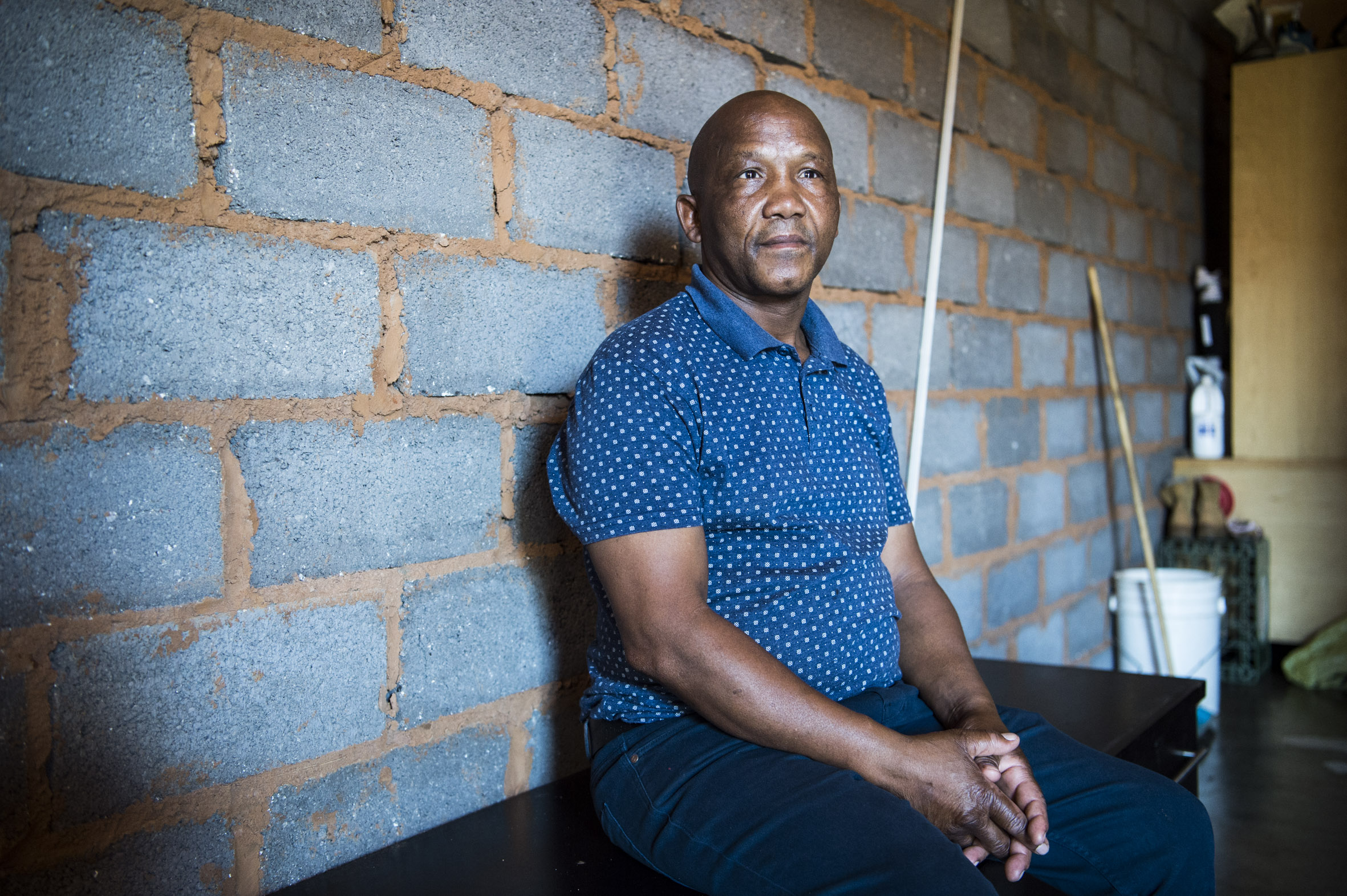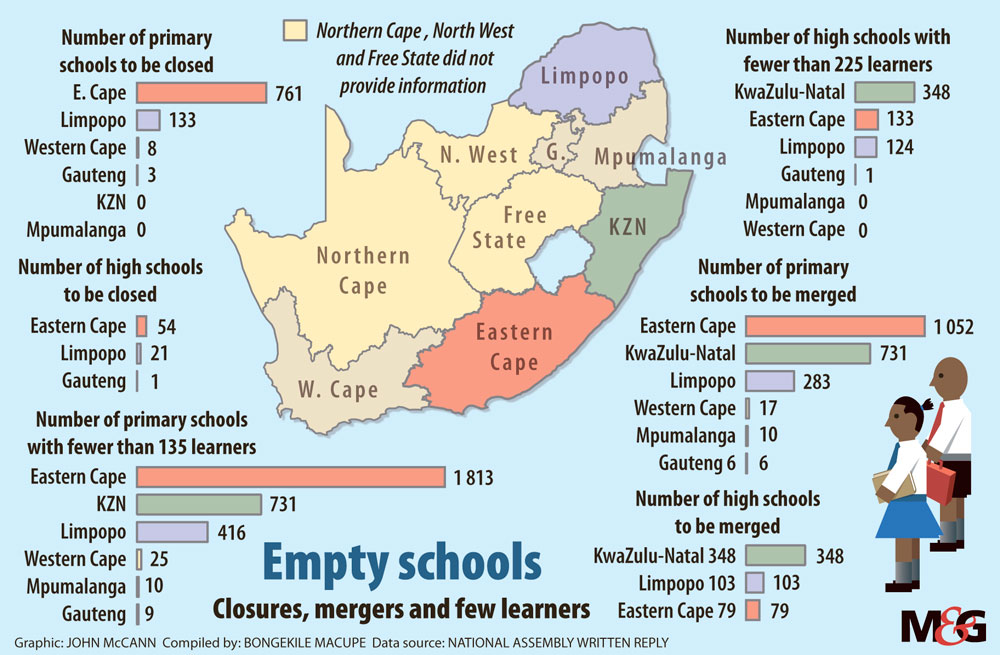Rebuilding: parts of Igugu Primary School in Mofolo South, Soweto, still need to be repaired and tidied up. (Delwyn Verasamy/M&G)
Michael Malapane is from the Free State. But like so many other South Africans he has long left the place of his birth in search of economic opportunities in the urban centre of the country. He lives in Soweto now. But his home is an unusual one — a classroom in an abandoned school building.
“I moved here 15 years ago,” he says sitting on a sofa and stroking his pet tortoise inside the classroom he calls home. He moved into Mabewana Primary School in Mapetla after he was retrenched from a mine in Westonaria.
 Business and pleasure: Michael Malapane lives a classroom at the former Mabewana Primary School in Mapetla, Soweto. He shares his home with a church group on Sundays. (Delwyn Verasamy/M&G)
Business and pleasure: Michael Malapane lives a classroom at the former Mabewana Primary School in Mapetla, Soweto. He shares his home with a church group on Sundays. (Delwyn Verasamy/M&G)
On Sundays from 11am to 2pm he has to vacate his home to make space for a church group.
Several A3 pages with the words of popular Sesotho hymns such as Re a Boka Morena and Seli la ka Mponesetse Tsela are stuck on the chalkboard. This is testament that the classroom is a home to Malapane and a church to others.
“I don’t like staying here. I’m staying here because I don’t have land, I don’t have a house. If I had a house I would not be staying here,” he says.
He’s not the only resident of the school building, which was closed about 18 years ago. Today, it is a hub for people who have no other place from which to run their businesses. Malapane does not run a business; he survives on his social grant.
Entering the building, the buzzing sound of a grinder is an announcement of how far this building has evolved from its original purpose. Men covered in white dust, welcome you into the building. They are manufacturing tombstones.
The owner of the business, who didn’t want to give his name, said he started working from the school earlier this year. He is not from Mapetla but was looking for a place to run his business and was told of the school.
He never asked for permission to work at the building and he does not pay rent.
Strolling around the property, the broken windows offer a peek into the new life of the school. Piles of old sofas lining the walls are surrounded by stacks of wood, chairs and rolls of fabric — upholstery and carpentry are popular businesses here. But there is also a mystery behind some of the windows; curtains shut out the gaze of curious visitors.
 Businesses such as upholstery and carpentry are run from the other classrooms at Mabewana Primary School. (Delwyn Verasamy/M&G)
Businesses such as upholstery and carpentry are run from the other classrooms at Mabewana Primary School. (Delwyn Verasamy/M&G)
There is another sound to be heard; the small voices of children at a crèche. Johanna Khumalo says she is one of the first people to operate a business at the school. She opened her crèche in 2002 after getting permission from the councillor at the time.
Back then she cared for about 50 children but now there are eight. She attributes the decline to more crèches opening in Mapetla and notes that some parents might not be comfortable with the environment and types of businesses being run at the school.
Those who operate from the school say their presence helps prevent the school from being vandalised.
Not far away, Tirisano Primary School in Molapo was closed nine years ago. The small number of children enrolled at the school were moved to Sekwati Primary School just next door to it.
 Vacant: Tirisano Primary School in Molapo, Soweto, was closed nine years ago and was then stripped of anything of value. It was demolished earlier this year. People living in the area want a library to be built there. (Delwyn Verasamy/M&G)
Vacant: Tirisano Primary School in Molapo, Soweto, was closed nine years ago and was then stripped of anything of value. It was demolished earlier this year. People living in the area want a library to be built there. (Delwyn Verasamy/M&G)
The abandoned school building had become a site of danger, according to residents of Molapo who spoke on condition of anonymity. Some said a woman was murdered there.
The school had been vandalised and was left without doors, windows and electric cables. Anything of value had been stripped from the building.
In March this year, the school was demolished. The Molapo residents say they were not consulted and assume it was done by government.
Now only the foundation remains. Gauteng News reported last month that Molapo residents were calling for a library to be built in the space because they have to walk a fair distance to one.
The incidence of schools with low enrolment numbers is increasing around the country.
There were five learners at Zintle Primary School in Makhada in the Eastern Cape and only 12 at Cebolethu High School in Dordrecht.
These details were among those in a written reply to Parliament by Basic Education Minister Angie Motshekga, after she was last year asked to provide the number of learners at each school in the country.
In another written reply, in September this year, Motshekga said 3 004 schools in six provinces faced closure. Others would be merged over the next four years because enrolment numbers had dropped to below that required to operate.
Zintle and Cebolethu schools are among the schools to be shut down. Healdtown Comprehensive School near Fort Beaufort in the Eastern Cape is to merge with another school. The school was founded by missionaries in 1855 and was attended by Nelson Mandela, Robert Sobukwe and Raymond Mhlaba.
Last year, the Daily Dispatch reported that renovations of the school’s hostel, which was burned down during the 1976 Soweto student uprising, had cost R46-million. The refurbishment consisted of 195 beds, a museum, kitchen, laundry and an entertainment area.
There were only 158 learners at the school last year.
According to the basic education department, a primary school must have a minimum of 135 learners and a high school 200 learners for it to be deemed viable.
Other schools have previously merged with Healdtown this had created other problems.
Earlier this year, the Sunday Times reported that only 17 schoolchildren had returned to Reshwa Secondary School in Peddie at the start of the new school year. The school was shut down and the pupils were sent to Healdtown, 160km away. Parents told the newspaper that their children went for days without food.
Motshekga said that once a school was shut down it was handed over to the provincial departments of public works.
Malibongwe Mtima, spokesperson for the Eastern Cape department of education, said research had established that the main driver of low enrolments at schools was parents moving to places where there are work opportunities. Some migrate to other provinces.
He added that the schools to be merged or closed are in both urban and rural areas.
Leanne Jansen, the spokesperson for Equal Education, said the lobby group supports a lawful and democratic process of closing down or merging schools that are no longer viable.
“Small schools tend to have lower student to teacher ratios, and rationalisation may distribute teachers more efficiently and evenly, and allow the provincial departments to better monitor and support schools,” she said. “Rationalisation can lead to improvements in teaching and learning — in small schools teachers are responsible for multiple grades in a single class.”
She said learners at schools scheduled to be closed must be guaranteed a place in other schools.
“Some of the ‘new’ schools are further from learners’ homes and the provision of scholar transport is a constant challenge,” she added. “Learners need guaranteed transport to their new schools.
“In cases where there is too far to commute daily, there must be hostels built at destination schools before closure of non-viable small schools.”
Igugu Primary School in Mofolo South, Soweto, was closed 11 years ago and merged with another primary school nearby.
For years the Igugu school building was abandoned and was vandalised. Most of the classrooms have no doors or windows. What used to be the toilets are now a dingy space filled with old books and the stench of urine. There is overgrown grass in some parts of the yard.
It was in March when several nongovernmental organisations (NGOs) and nonprofit organisations moved into the school under the umbrella body of the Community Information and Development Centre (CIDC).
Now older women come to the former school to do aerobics and eat breakfast and lunch. Two learnerships — for beauty therapy and project management — are being run at the building.
 Rebuilding: Igugu Primary School in Mofolo South, Soweto, is now occupied by several nongovernment organisations. Among the activities are aerobics classes and two training programmes. (Delwyn Verasamy/M&G)
Rebuilding: Igugu Primary School in Mofolo South, Soweto, is now occupied by several nongovernment organisations. Among the activities are aerobics classes and two training programmes. (Delwyn Verasamy/M&G)
CIDC president Simphiwe Khumalo said sponsorships had enabled the organisation to renovate some of the classrooms for their new uses. This included buying new doors and window frames and fixing one block of toilets.
He said they had tried to approach the Gauteng department of infrastructure development to ask for permission to use the school but without luck.
“For years this school was closed and now we have come in and are putting it to good use and in the process of uplifting the community, but people who have their own agendas are fighting us for that,” he said.
His organisation hopes to turn the school into a one stop shop for NGOs who want to bring development to the people of Mofolo and surrounding neighbourhoods.
On Motshekga’s list of schools to be closed in Gauteng are three primary schools. One of them is Bakgomana. But this school, in Diepkloof Zone 4, was closed 11 years go. In January last year several families moved in.
Shacks almost fill the former school grounds. The two blocks of classrooms have become homes to some of the families.
It was quiet when the Mail & Guardian visited the school this week. Most of the shacks were locked while their occupants were at work.
David Maluleke, who lives at Bakgomana, said after the school was closed it had become a haven for criminals.
“You would never pass here at night. People who smoke nyaope used to stay here. People would steal cars and come and hide them here. Stolen goods were being stored here. This place was havoc,” he said.
Some of Zone 4’s residents decided “enough was enough” and decided to do something about the school, but there was little left of it. Maluleke said they did not invade the school but came together to protect the structure from vandalism and to combat crime.
 Housing shortage: Bakgomana Primary School in Diepkloof Zone 4, Soweto, was taken over by criminals after it was closed. But then residents of the area decided to reclaim it. David Maluleke is one of the people who moved in (Delwyn Verasamy/M&G)
Housing shortage: Bakgomana Primary School in Diepkloof Zone 4, Soweto, was taken over by criminals after it was closed. But then residents of the area decided to reclaim it. David Maluleke is one of the people who moved in (Delwyn Verasamy/M&G)
“When we got here we found so many things: stolen TVs, there was blood on the walls and floors. There was a girl who was found dead in this school. We came in last year on the 14th of January. We said enough is enough.
“We started allocating space to people to build their shacks. I was born and bred here [in Diepkloof] and I know the people from around here. What we said is that this school is going to be occupied by ward 27 because Diepkloof does not have RDP houses; people do not have places to stay.”
He said people who erected shacks were people who came from four-roomed houses that were congested; people had to sleep on the dining room floor.
Maluleke said it was also decided to make space for people who needed a place to stay even though they were not from ward 27.
“Us moving here is also awareness to government to say people from Diepkloof need houses. That is what is at the centre of people occupying this school,” he said.
“If they come and evict us from here then we need them to give us land. It’s either they are going to build us RDP houses or give us land to build our own houses. We are not going to leave this place for it to go back to the criminal haven it was.”
There are 240 shacks and each classroom, of which there are 15, has been divided into two rooms.
“You can’t have a big space. We are not here for luxury, we are here to have a peace of mind and a place to sleep,” said Maluleke.
No one pays rent but every month each household is expected to contribute R50 for maintenance of such things as water pipes and toilets.
Maluleke said when they also had to collect money to buy doors and windows for all the classrooms.
In February the former MEC of infrastructure development, Jacob Mamabolo, told the Sowetan newspaper — which reported about people moving into Bakgomana — that in the next financial year there will no longer be abandoned schools. He said that a register had been compiled of all immovable property, and a decision would be made about what to do with the assets.
Mamabolo added that those who invaded government property would be evicted.
 (John McCann/M&G)
(John McCann/M&G)